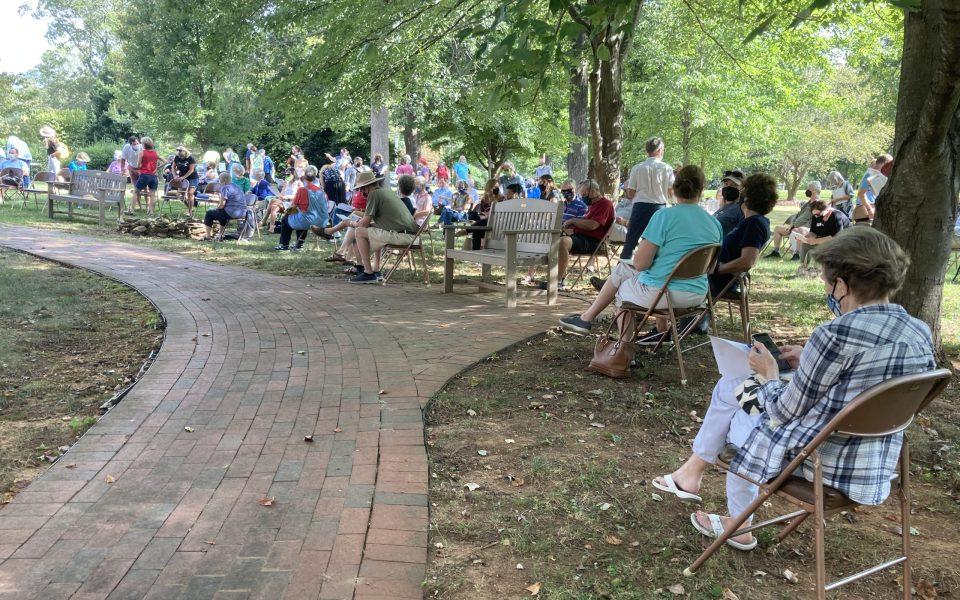Featured photo: Dozens of people gathered at the New Garden Friends Meeting House to learn more about how to help the Afghan people who will be coming to the city in the next few weeks. (photo by Nicole Zelniker)
Soon, an estimated 100 Afghans are expected to resettle in Greensboro, and all of them will need help.
On Sept. 18, dozens of Greensboro residents gathered behind New Garden Friends Meeting to learn how to aid their newest neighbors.
Deborah Suess, Interim Minister at New Garden, introduced Million Mekonnen, Executive Director at North Carolina African Service Coalition. Mekonnen explained to the group of would-be volunteers that although NCASC has been actively resettling refugees since 1997, this would be a new type of challenge.
“We’re in a very different time,” said Mekonnen. “This is an emergency evacuation.”
The Migration Policy Institute estimates that 65,000 Afghan evacuees will have to be resettled in the U.S. by the end of the month, and another 30,000 in the next year. Many are fleeing the country after the culmination of a decades-long conflict that has led to a Taliban takeover of the government.
There are four groups of people coming in to the U.S. from Afghanistan. The first are those on a special immigrant visa, those who worked for the U.S. government or government contractors in Afghanistan for a designated period of time. The second are refugees. The third are SQ/SI parolees, or those with pending special immigrant visa status. The last are humanitarian parolees.
The majority will be humanitarian parolees, which means they will not be available for federal benefits, such as medical benefits, food stamps and the right to apply for a green card. They are, however, able to apply for asylum status, which would grant them the benefits if they are approved.
Mekonnen and NCASC are pushing for co-sponsorships, which would allow people in the community to help the Afghan people find transportation and housing, and adapt to the community.
“Resettlement is not a one-agency job,” Mekonnen said. “We have to bring everybody.”
NCASC is not the only agency working to bring people into Greensboro and connect them to friends, jobs and housing. FaithAction and Church World Services have partnered to do similar work in the community.
“We have some fantastic staff who are working to turn strangers into neighbors, to make sure anyone in the community who comes in as an immigrant or refugee has a supportive space,” said Adriana Adams at FaithAction. “It’s a difficult climate to be in if you’re not accepted as a legal citizen. We provide DACA support, and then we also have case management support for families and individuals who are newcomers.”
Right now, FaithAction’s biggest priorities are food, permanent housing, transportation, education and job connections. And while all of these are important, some Greensboro residents are wondering how things like housing will play out when there is so little affordable housing accessible to begin with.
“That gets into the issues Greensboro and most medium and large cities are facing,” said community organizer Andrew Young. “Where can you place people given a limited amount of housing?”
Young has a long history working with refugees and other groups coming to Greensboro through the Bonner Center at Guilford College. He hopes agencies will be able to get all of the resources they need, but also knows it could be a struggle.
He’s seen things go terribly wrong too. In 2018, five Congolese children died in an apartment fire, pushing refugee families and activists to fight for better conditions. But the parents of those children will never get their kids back.
“Kids died in this scenario,” said Young. “The agencies were never held accountable.”
Affordable housing has long been a difficult find for even current residents, and the wait list of low-income housing is long enough that many already on it may end up houseless before they reach the top. Despite the eviction moratorium in place earlier this year, people have still found themselves without housing.
“It’s good that they’re saying they need help, but there’s not an easy answer to that,” said Young. “There are a lot of folks in our town who want refugees to come here. I want them to. But there’s not an easy solution.”
FaithAction will be holding a fundraiser on October 16 from 6 p.m. to 9 p.m. at LeBauer Park. Learn more at faihouse.networkforgood.com.
Join the First Amendment Society, a membership that goes directly to funding TCB‘s newsroom.
We believe that reporting can save the world.
The TCB First Amendment Society recognizes the vital role of a free, unfettered press with a bundling of local experiences designed to build community, and unique engagements with our newsroom that will help you understand, and shape, local journalism’s critical role in uplifting the people in our cities.
All revenue goes directly into the newsroom as reporters’ salaries and freelance commissions.


Afghani is the name of Afghan money. 100 Afghanis is $1.25 in USD. Afghan people plural is Afghans. Afghan plural money is Afghanis.
Thanks! Thought we caught those mistakes. Will fix now.